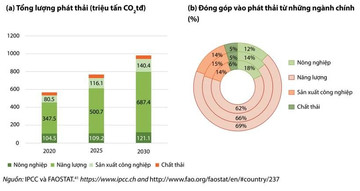- © Copyright of Vietnamnet Global.
- Tel: 024 3772 7988 Fax: (024) 37722734
- Email: [email protected]
carbon credit market
Update news carbon credit market
Vietnam’s carbon market development project approved
The project is designed to accelerate the development of a low-carbon economy and address climate change, working toward the goal of achieving net-zero emissions by 2050.
Vietnam to pilot carbon trading market in 2025
Vietnam is set to pilot its carbon market operations in the second half of 2025, aiming to establish a foundation for sustainable emission reduction and green growth.
Carbon market – a key for VN on the path to net zero
With a focus on the country’s net zero 2050 target, the event provided an opportunity to assess both the carbon credit mechanism and Việt Nam’s broader strategy for addressing climate change.
VN to pilot carbon trading market nationwide, no int’l sales until 2029
From 2025 to 2028, Vietnam will implement a nationwide pilot for its carbon market, but will not sell carbon credits abroad during this period, according to the latest draft proposal.
Appropriate mechanisms are needed to develop the carbon credit market
According to experts, the sooner the carbon market is organised, the more beneficial it will be for Viet Nam, helping us implement green strategies not only domestically but also globally.
Should Vietnam introduce a carbon tax? experts weigh the pros and cons
As Vietnam considers implementing a carbon tax, experts are divided over its potential benefits and drawbacks. While some believe it will help reduce emissions, others warn of potential economic harm.
VN has great advantages in carbon credit market
A stable political regime, high potential for carbon market, and the 16th global position in biodiversity are Vietnam's advantages in the world carbon credit market.
Flexible solutions crucial to develop carbon market: Deputy PM
In the 2025-2028 period, the carbon market will be piloted nationwide, carbon credits will not be sold abroad.
Vietnam capable of earning revenue from carbon credit trade
Vietnam is capable of selling some 40 million carbon credits for a revenue of US$200 million annually, the Department of Forestry has calculated.
Vietnam capable of earning US$200 million per year from carbon credit trade
Vietnam is capable of selling some 40 million carbon credits for a revenue of 200 million USD annually, the Department of Forestry has calculated.
Vietnamese businesses pay attention to carbon market
Participation in the carbon market is an opportunity for organizations and businesses to transform to green production, so many businesses are starting to pay attention.
Vietnam soon perfects its legal framework for future sale of carbon credits
Vietnam will soon perfect its legal framework for the future sale of carbon credits after the Southeast Asian country has sold 10.3 million forest carbon credits.
World Bank to support Ho Chi Minh City on carbon credits
The challenges presented by the carbon credit market were the main talking points of a meeting on January 24.
Vietnam has great potential in development of carbon credit market
2023 marked a significant milestone for the forestry sector as Vietnam successfully sold 10.3 million forest carbon credits (10.3 million tonnes of CO2) for the first time through the World Bank (WB) for US$51.5 million.
National carbon-credit exchange establishment proposed
The formation of a carbon credit market is part of Vietnam's commitment to net-zero emissions and the use of economic tools to manage enterprises’ greenhouse gas emissions.
Agriculture ministry wants to sell 5.9 million tons more of carbon dioxide
The Ministry of Agriculture and Rural Development (MARD) has reported to the government about the signing of documents on transferring 10.3 million tons of CO2 to the World Bank which will bring turnover of VND1.25 trillion.
Vietnam gets over US$50 million from forestry carbon credits sales
For the first time Vietnam has sold 10.3 million forestry carbon credits (10.3 million tonnes of carbon dioxide CO₂) this year, bringing in US$51.5 million, according to the Ministry of Agriculture and Rural Development (MARD).
VN studies international experiences for carbon trade exchange design
Vietnam is learning from international experiences to develop a carbon market to ensure its appropriateness to the country’s legal framework and infrastructure system.
Measures to promote carbon trading platform in Vietnam
By late 2022, about 29.4 million carbon credits have been created in the country under CDM and 10 million under GS and VCS.
Vietnam sees huge potential for carbon credits from forest, agriculture, energy
The domestic carbon credit market will not launch until 2028, yet there is now a huge potential of benefits from a great number of buyers and sellers.



















